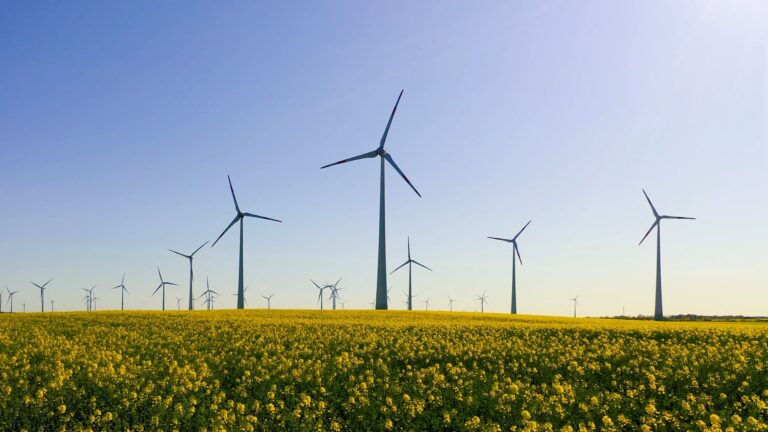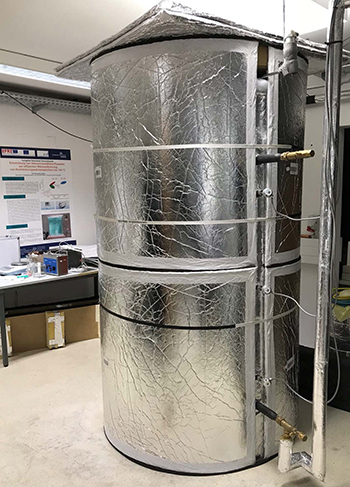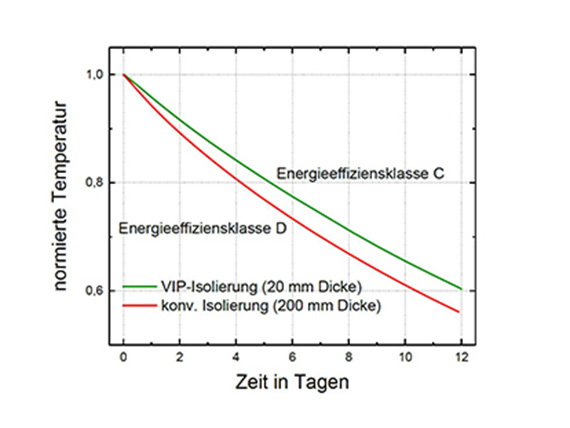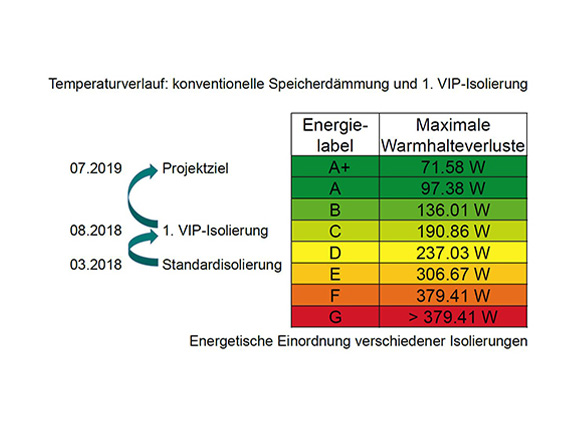Research and Development
20 years of experience and price-winning technology
In 2001 when the company was founded, it was based on research conducted and developed at Bavarian Center for Applied Energy Research (ZAE). The idea that there is always room for improvement and innovation, is therefore the very core of va-Q-tec and the company’s visionary approach. To carry this on, va-Q-te-c is continuously involved with different research projects with the purpose of developing new and sustainable solutions in the thermal insulation industry. Due to the universal motivation behind elevating knowledge in this areas, some projects are EU granted and extensive collaborations between multiple companies, universities and institutions.
Projects
Research project coCO2vac: Climate-friendly and energy-efficient alternative for transports at -70 °C
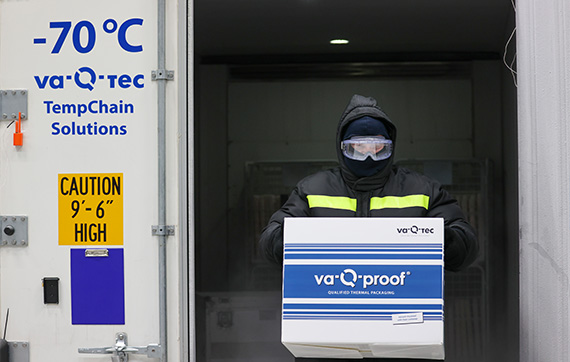
Some of the urgently awaited vaccines against CoVid-19 require a stable temperature chain of -70 °C for safe storage and transport. The conventional solution to this constant cooling is the use of dry ice. This compressed CO2 is produced in an energy-intensive process. The substance changes directly from a solid aggregate state to a gaseous state while releasing coolness: The CO2 evaporates to form the climate-damaging greenhouse gas and is therefore not reusable. The substance disperses into the air during evaporation. Strict safety rules and regulations apply for its use, especially in air travel. This is an additional challenge, especially with the global distribution of the Corona vaccine.
As part of the coCO2vac research project, va-Q-tec is searching for a solution together with the Center for Applied Energy Research (ZAE) Bayern: The aim is to develop special climate-friendly temperature storage elements (PCMs) for power-free cooling in the ultra-low range of down to -80 °C. The advantages are clear: In order to replace a cooling capacity of one kilogram of dry ice, about two and a half kilograms of PCMs are required. Despite the greater weight, using the temperature storage element is more energy-efficient than producing the required amount of dry ice – especially when using energy-efficient cooling systems. The PCMs can be used over 50 times, making them much more sustainable.
The aim is to test this new product development in practice within a few months and thus make the logistics of the CoViD-19 vaccine more climate-friendly and energy-efficient. However, the transport of other drugs will also benefit sustainably from this new development, as tissue and blood samples and blood plasma must also be stored at absolutely low temperatures.
Development of vacuum insulation panels for efficient thermal insulation of high-performance heat storage tanks up to 130°C
Reco2sT
The European residential building stock needs to be refurbished to achieve the targets relevant to energy efficiency and to secure healthy and comfortable living conditions. RECO2ST addresses the challenges of nZEB (zero energy building) refurbishment through a systemic 3 step approach: First a Refurbishment Assessment Tool (RAT) will create refurbishment scenarios. Second, Action Plans for the renovation will be formed through Integrated Project Delivery (IPD) and finally a refurbishment package of innovative and customizable technologies will be installed (Retrofit-Kit). The Retrofit-Kit features cost efficient and modular technologies such as vacuum insulation panels (VIP) and Nature Based Technologies (NBT).
Their integration into personalized refurbishment packages for four demonstration sites will be conducted and validated. The modularity and adaptability of the RECO2ST Retrofit-Kit is key to achieving the expected performance and the Least-Cost method developed. The demonstration sites will be refurbished into nZEBs (zero energy building) achieving savings between 71 and 99%, with excellent internal environmental quality and payback in less than 15 years.
Innovip
va-Q-tec is a partner in the project Innovip, funded under grant agreement No. 723441 by the European Union’s Horizon 2020 research and innovation program. The project is developing and reinventing innovative, highly efficient and cost effective vacuum insulation panels (VIPs) for construction. The VIPs will be made adjustable, mountable and machinable and the thermal performance is planned to be improved over the entire lifetime by a minimum of 25%.
By reducing the density of the core material and/or using an alternative core material together with less expensive VIP-envelopes as gas barrier, it will be possible to sell the new product INNOVIP by more than 20 % lower price. These additional functions can be adjusted according to the application they address. Currently there is no such material on the market. It is expected that these new products will promote a gradual change in energy efficiency, both for new buildings and refurbishment projects.
VIDI
Theme: Switchable Vacuum Insulation Panel for energy efficient facades
The development envisioned in this project is based on a cost-effective, energy-efficient and adaptive façade component, which offers high thermal insulation and highly efficient solar energy. The idea is to use switchable thermal insulation (SWD) based on vacuum insulation panels (VIP). In the completed project Enotec funded by the BMWi, valuable results were obtained for the development of the STI based on VIP and hydride getter .Particularly the work on double envelope and a sufficiently gas-tight sealing of the switchable VIP as well as the development of a getter-heater system had a high research effort.
In the VIDI project, the above-mentioned priorities are to be optimized and the use of switchable VIPs extended to other areas of application such as residential containers. Due to the function of an STI installed on the southern façade of a building can be used for cooling in summer and for heating in winter. During the project, functional patterns are developed in a demo production line and which converts the project’s work objectives into practice.
Period: 01.08.2017 to 31.12.2019
Partner: Bayerisches Zentrum für Angewandte Energieforschung e. V. (ZAE Bayern), Saint Gobain Isover
Funding agency: Federal Ministry for Economic Affairs and Energy
Funding measure: EnEff.Building.2050 – Innovative projects for the almost climate-neutral Building stock 2050
Building stock 2050
Funding area: Innovation projects
Funding code: 03EGB0005B
Project manager: Markus Arntzen
TEC50
Theme: Development of a commercial freezer with extremely low energy consumption
The share of supermarket refrigeration in the final energy demand for refrigeration in Germany is 10%, which is 1.4% of the electrical energy consumed. Characteristic of sales refrigeration furniture in supermarkets are wall insulation based on plastic foams, large transparent glass surfaces and frequent opening and closing. An improvement of the insulation is possible with previous solutions only by additional use of materials.
The project will develop a new, ultra-efficient system for freezer isles. The key points are new, thin-walled, self-supporting construction solutions based on vacuum insulation panels, highly efficient and lightweight insulating glass with infrared protection, and intelligent control technology that influences the air control even before opening the devic. va-Q-tec will be responsible for the development of the high performance insulation and mechanically strong VIP panels, the VIP-Spacer for insulating glass as well as the production of the test samples and for the demonstrator. Another focus is the test methodology for lifetime-related evaluation of the insulation effect of VIP panels.
Period: 01.02.2017 to 31.01.2019
Partner: KMW Kühlmöbelwerk Limburg GmbH, Security Glass Tauberbischofsheim, Skill Software GmbH
Funding: Federal Ministry of Education and Research
Funding measure: innovative SMEs
Funding area: energy efficiency and climate protection
Funding code: 01LY1612B
Project manager: Marc Mölter
EU Researchproject THEcore
Theme: Nanostructures foams for vacuum insulation panels
Energy supplies and global warming are two of the most important challenges that the world will face in the years to come.
Aware of future sustainability, the European Union has set roadmap targets to reduce CO2 emissions by 80-95% below 1990 levels by 2050*.
As about 40% of total energy is consumed by the household sector** (heating, air conditioning, refrigeration), advanced thermal insulation products give a crucial contribution to better energy efficiency.
Vacuum Insulation Panels (VIPs) are currently the most effective solution. By offering up to ten times higher thermal insulation than traditional materials of the same thickness, VIPs need much less space. Besides the high insulation capacity, volume reduction by the use of VIPs increases usable space, eases waste disposal, lowers extra logistic costs and transport emissions while reducing the energy needed to keep the temperature at a desired level.
The search for lightweight, nanometric open pore materials at lower production costs than e.g. aerogels has been a challenge for the scientific VIP community. The THEcore project is on the cutting edge of such materials technology, as it is testing and adapting completely novel open pore nanostructured polystyrene foams (“SUMFOAM”), in partnership with the company SUMTEQ GmbH, for use in VIPs.
In addition to setting a new figure-of-merit in VIPs, the ultimate goal of the project is to contribute to the EU strategy of reducing energy impact by establishing advanced, application-tailored VIP products with a higher thermal efficiency and a reduced weight compared to existing VIPs.
*http://www.europarl.europa.eu/meetdocs/2009_2014/documents/com/com_com(2011)0112_/com_com(2011)0112_en.pdf
**http://bpie.eu/documents/BPIE/publications/LR_nZEB%20study.pdFunded under: H2020-EU.1.3.2. – Nurturing excellence by means of crossborder and cross-sector mobility
Funded scheme: MSCA-IF-EF-SE – Society and Enterprise Panel
Project ID: 748256
Project duration: June 2017 – May 2019
Call for proposal: H2020-MSCA-IF-2016
Coordination and technical information: Dr. Flávia A. Almeida (granted researcher)
Dr. Roland Caps (supervisor)
„This project has received funding from the European Union’s Horizon 2020 research and innovation programme under the Marie Sklodowska-Curie grant agreement No 748256”.
